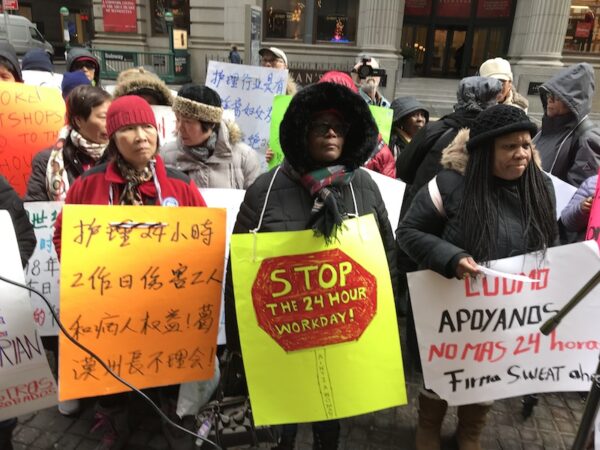NEW YORK, N.Y.—In an unusual class-action grievance arbitration, 42 home health-care agencies have been ordered to pay $30 million for underpaying workers represented by 1199SEIU.
On Feb. 25, arbitrator Martin F. Scheinman issued a ruling that the agencies must pay that money into a special wage fund to cover claims by more than 100,000 current and former home health aides.
“The key issue was workers not getting paid for interruptions to sleep and meal breaks on 24-hour shifts,” Laureve Blackstone, 1199SEIU’s attorney, told LaborPress. “The other claims included issues such as failure to pay overtime under federal law between January 1, 2015 and October 12, 2015, failure to pay travel time between cases, and failure to pay spread of hours compensation under state law after 2017.”

Home health aides who stay with their client for 24 hours straight get paid for only 13 hours of that shift, but are supposed to get eight hours off for sleep and three hours for meals and personal breaks. In practice, those breaks are often interrupted, such as when the aide has to help the client to the toilet in the middle of the night. “Spread of hours” compensation is an extra hour of pay required for minimum wage employees if they work more than 10 hours in a day, either in one long shift or in two where the start and end are more than 10 hours apart.
1199SEIU filed the complaint in January 2019. Scheinman sent it to binding arbitration that December after mediation failed to produce an agreement.
The union said the class-action grievance was made possible by “a unique provision” in its 2015 collective-bargaining agreements for home-care workers. That provision, it said, provided “all of the protections and remedies that would be available to them in federal court,” and. “unlike nonunion workers who are forced to enter into one-sided arbitration agreements,” it enabled them to protect their rights “without having to pay a private attorney.”
“I am grateful to our union for making sure we as 1199 live-in workers receive payment for the hours we spent caring for our clients,” home-care worker Zhi Fang Gu said in a statement released by the union.
The employers involved included the Chinese-American Planning Council Home Attendant Program, First Chinese Presbyterian Community Affairs Home Attendant Corp., and United Jewish Council of the East Side Home Attendant Service Corporation. The lawyers representing them included the major management-side firms Jackson Lewis and Littler Mendelson.
They argued that the workers did not present enough detail to prove their wage-and-hour claims; that workers received training on how to submit forms indicating when their breaks had been interrupted during 24-hour shifts; and that any violations committed were not willful and were made in good faith — and therefore, any claims for wages from before January 2, 2017, were barred under the two-year statute of limitations for non-willful violations.
“I am persuaded required wages were underpaid to these employees, in varying amounts, during the coverage periods at issue,” Scheinman wrote in his decision. “I recognize not all of the Employers violated the covered statutes to the same degree or for the same periods of time, and a few of the Employers had no liability at all for claims made under certain of the covered statutes. Nevertheless, I conclude, in general, violations were committed by all of the Employers during their coverage periods, resulting in underpayment of required wages to the affected home health aides.”
He said the claims would have been impossible to litigate individually because of the volume of cases, and ordered the employers to contribute $250 per employee to the special wage fund. He said he chose the $250 figure because it was “the maximum that can be imposed” without risking “employers having to close, file for bankruptcy protection or engage in massive reductions in force.” For agencies who claimed they couldn’t afford to pay it, he said that $250 per employee was “a significant discount from potential liability.”
Scheinman ordered that a notice be sent to all eligible 1199 workers within 60 days, and they must respond in order to receive their portion of the fund. The union said it expects to pay all claims by August.
Eight workers were excluded because they were plaintiffs in other cases, and state courts ruled that they “were not required to arbitrate their claim,” Blackstone said.
Those eight included Leticia Panama Rivas, one of the about 60 workers who filed a class-action suit against First Chinese Presbyterian in 2016, demanding full pay for 24-hour shifts where they did not get uninterrupted breaks. “Those of us that are doing the work, we know we’re not getting five hours sleep,” Panama Rivas said at a protest in 2019.
In March 2019, the state Court of Appeals reversed a lower-court ruling that home-care workers had to get 24 hours’ pay for a 24-hour shift, but held that they could claim pay for the full 24 hours if they could prove they had not gotten five hours sleep or three hours of meal breaks. A bill to limit their shifts to 12 hours a day or 50 hours a week except in emergencies died in committee in the state Legislature in 2019.
The arbitration award, 1199SEIU noted, “does not resolve the multitude of wage and hour issues facing non-1199 home-care workers.” But it was “historic,” the union said.
“The Special Wage Fund is really the first of its kind covering an enormous number of workers,” Blackstone told LaborPress, “and the remedy that the arbitrator awarded was really only made possible because the workers were represented by 1199SEIU.”






